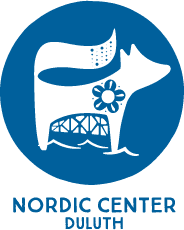Nordic Center of Duluth Land Acknowledgement Statement
From the Shores of Gichi-gami, the Nordic Center of Duluth exists on the traditional, ancestral, and contemporary lands of the Anishinaabe, Cree, Cheyenne, and Dakota people. We recognize that this stolen land was ceded from the Dakota and Ojibwe people through different treaties, including the Treaties of 1837 and 1854.
As an organization whose mission includes a desire to share our collective culture with the greater community, the Nordic Center recognizes that the land the Center rests on was given to Bichiki/ Gichi-waishke, also known as Chief Buffalo, by President Pierce in 1854, and was swindled from his descendants after his death. Indeed, our address on Lake Avenue is located on an ancient trail used by American Indian people to travel from their summer camps at Shagawamik (Park Point) to the winter camps on Canosia Lake (Pike Lake) and Kitchi-sagaiigun (Grand Lake).
We pay our respect to the ancestors of this land and reaffirm our relationship with one another as we continue on the path of reconciliation. We acknowledge the painful history of genocide, the forced removal, assimilation, and broken treaties which have alienated Indigenous people from their homelands. The Nordic Center of Duluth is committed to ongoing efforts to recognize, support, and advocate for American Indian peoples and their nations’ sovereignty.
This land acknowledgment, the resources made available via our organization, and our continued partnership development with area indigenous organizations are some of the ways in which we work to educate ourselves about this land, our relationships with it and each other. More resources about the history of the Indigenous people of Onigmiinsing (Duluth) can be found on our website.
MPR: Explaining Minnesota’s 1837, 1854 and 1855 Ojibwe treaties
1854 Treaty Authority: Environment
Our Home: Native Minnesota | Minnesota History Center | MNHS
Maada-ookiing | Land Acknowledgement
An Ethnographic Study of Indigenous Contributions to the City of Duluth
Acknowledge Indigenous Land – Duluth
Lake Superior Ojibwe Gallery (pdf file)
